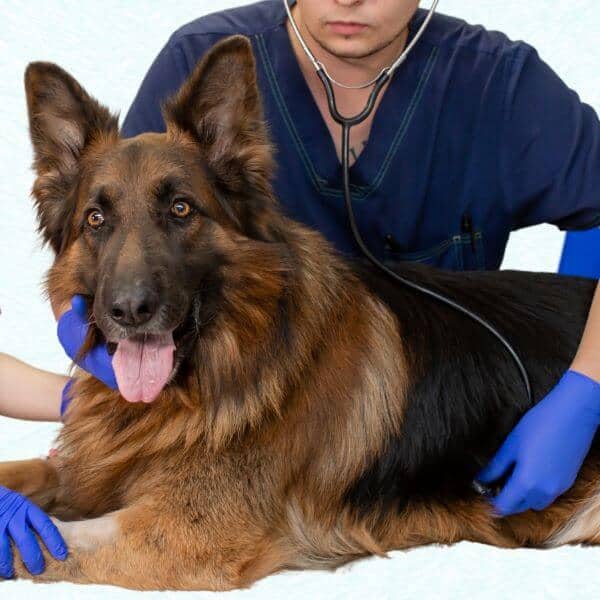Best Pet Insurance For German Shepherds: All You Need to know

Canine Bible is reader-supported. We receive affiliate commissions via some of our links. This doesn’t affect rankings. Learn more.
I’ve compiled everything you need to know to find the best pet insurance for German Shepherds. Having a German Shepherd myself, I understand how costly routine vet visits and everyday preventive care can be. Imagine this scenario: your GSD is playing and suddenly stumbles, resulting in an ACL injury. The veterinary costs in such cases can be astronomical, heavily straining your wallet. To help offset these costs and keep your GSD in excellent health, pet insurance is a lifesaver. I’ve personally reviewed and selected the top pet insurance providers that offer coverage for both adult and puppy German Shepherds. In this guide, I’ll explain why it’s crucial to consider pet insurance for your German Shepherd. Let’s dive in!

Why you should trust us: Our writers, editors, and in-house veterinarians spend hours analyzing and reviewing products and services to help find what’s best for you. Read the product review methodology and editorial mission to find out how we test, analyze, and rate.
Best German Shepherd Pet Insurance — At A Glance
What Is German Shepherd Pet Insurance: Pet insurance is a healthcare policy that provides coverage for your pet, offering reimbursement for specific veterinary expenses. This ensures that your savings remain secure despite unforeseen medical costs. Such a policy involves a monthly premium. Should your pet fall ill or sustain an injury, you would file a claim with the insurance company to recoup your expenses.

The monthly premium for German Shepherd pet insurance
$44 to $63
How Much Does Pet Insurance Cost For German Shepherds?
The cost of pet insurance for a German Shepherd dog will vary based on several factors, including the pet’s existing health conditions, sex, age, and the area you reside in. It’s important to remember that with the progression of veterinary technology and increased claims within your locality, your insurance premiums may rise. For example, even if your German Shepherd is quoted at $55 per month, this rate is not fixed and could change.
According to our research, plans for German Shepherds can range from $44 to $63. You may spend more or less depending on where you live, the deductible rate and the reimbursement percentage you choose. German Shepherd owners can expect to pay an average $54 monthly premium.
Pet Insurance Quotes For German Shepherds
We compared quotes from renowned pet insurance providers to estimate your expected average monthly premium for different life stages in German Shepherds.
| Company | Deductible | Reimbursement | Annual Reimbursement Limit | Monthly Price | Location | Gender | Breed | Age |
|---|---|---|---|---|---|---|---|---|
| Lemonade | $500 | 70% | $100,000 | $49.65 | SC, 29044 | Male | German Shepherd | 6 years |
| Spot | $500 | 70% | Unlimited | $57.74 | SC, 29044 | Male | German Shepherd | 6 years |
| Healthy Paws | $500 | 70% | Unlimited | $60.96 | SC, 29044 | Male | German Shepherd | 6 years |
| Lemonade | $500 | 70% | $100,000 | $44.13 | CA, 95842 | Female | German Shepherd | 2 year |
| Spot | $500 | 70% | Unlimited | $63.16 | CA, 95842 | Female | German Shepherd | 2 year |
| Healthy Paws | $500 | 70% | Unlimited | $49.80 | CA, 95842 | Female | German Shepherd | 2 year |
| Lemonade | $500 | 70% | $100,000 | $47.53 | TX, 75219 | Female | German Shepherd | 6 months |
| Spot | $500 | 70% | Unlimited | $62.46 | TX, 75219 | Female | German Shepherd | 6 months |
| Healthy Paws | $500 | 70% | Unlimited | $54.07 | TX, 75219 | Female | German Shepherd | 6 months |
German Shepherd puppy monthly cost: $55
Adult German Shepherd monthly cost: $52
Senior German Shepherd monthly cost: $56
Is Pet Insurance For German Shepherds Worth it?
The decision to purchase pet insurance for your German Shepherd hinges on various factors, including your pet’s health risk proclivity, tolerance for financial risk, and overall financial circumstances.
Consider a scenario where your German Shepherd falls seriously ill or suffers an injury from an accident, incurring veterinary bills in the thousands. On average, the most common dog treatments cost $254.[1] A more severe and common condition in German Shepherds, like Gastric Dilatation Volvulus (Bloat), can cost between $1,500 and $7,500 to diagnose and treat. Can you pay for an unexpected $7,500 veterinary bill out-of-pocket? Most people can’t. The Federal Reserve states that 40% of Americans don’t have enough savings to cover a $400 emergency and 57% of U.S. adults cannot afford a $1,000 emergency expense.[2]
Investing in pet insurance for your German Shepherd is a wise choice to protect your finances and ensure your dog can receive the necessary care. With pet insurance, should an unexpected accident or illness occur, you could be reimbursed for 70% to 100% of the veterinary costs, depending on the details of your plan and provider. Pet insurance gives peace of mind, knowing your finances and pet’s health are covered.
Predict & Protect Your German Shepherd’s Future Health
Canine Bible uses years of clinical health findings, pet insurance data points, trends, and surveys to identify common health conditions in dogs. By gaining insight into your German Shepherd’s potential future health issues and risks, you can take preventive action today and ensure that your German Shepherd does not become a part of these statistics.
1 in 3
dogs will need emergency veterinary treatment every year.
$250 to $8K
is the average cost of unexpected veterinary care for dogs.[3]
13.6%
of GSDs die from musculoskeletal disorders and inability to stand.[4]
7.89%
of GSDs are affected by ear canal inflammation.[5]
If you know your dog’s breed is predisposed to certain health issues, we strongly advise getting a pet insurance policy while your dog is still healthy. Chronic health conditions, emergencies, and vet visits can rack up costs throughout your German Shepherd’s life. Pet Insurance can spare you a lot of financial trouble.
Dogs that develop chronic conditions under pet insurance coverage are guaranteed reimbursement for these issues for the duration of their life.Most Common Health Conditions In German Shepherds
Cost to treat cardiomyopathy
Cardiomyopathy in dogs refers to heart muscle diseases impairing the heart’s ability to pump blood effectively. This condition can lead to heart enlargement, diminished cardiac function, and ultimately heart failure.
*The overall cost of diagnosing and treating illnesses and injuries may vary. The above cost is based on average veterinary vet bill reports and claims submitted by pet insurance policyholders. We’ve used a 90% reimbursement rate for this scenario.
Cost to treat aortic stenosis
Aortic stenosis in German Shepherd dogs is a heart condition where the aortic valve narrows, hindering blood flow from the heart. It can cause fatigue, fainting, and heart murmurs.
*The overall cost of diagnosing and treating illnesses and injuries may vary. The above cost is based on average veterinary vet bill reports and claims submitted by pet insurance policyholders. We’ve used a 90% reimbursement rate for this scenario.
Cost to treat bloat
Bloat also known as gastric dilatation-volvulus, is a rapid stomach expansion with gas and often a twist, obstructing blood flow. It’s a life-threatening emergency causing distress, drooling, and a swollen belly.
*The overall cost of diagnosing and treating illnesses and injuries may vary. The above cost is based on average veterinary vet bill reports and claims submitted by pet insurance policyholders. We’ve used a 90% reimbursement rate for this scenario.
Cost to treat hypertrophic osteodystrophy
Hypertrophic Osteodystrophy in German Shepherds is a bone disease affecting rapidly growing large breed puppies. It causes pain, swelling in limbs, and fever. The cause is unknown, but it’s linked to diet and genetics.
*The overall cost of diagnosing and treating illnesses and injuries may vary. The above cost is based on average veterinary vet bill reports and claims submitted by pet insurance policyholders. We’ve used a 90% reimbursement rate for this scenario.
Cost to treat hip dysplasia
Hip dysplasia involves abnormal development of the hip joint, leading to looseness and instability. This genetic disorder is exacerbated by rapid growth, obesity, and environmental factors. Symptoms include limping, difficulty in movement, and arthritis.
*The overall cost of diagnosing and treating illnesses and injuries may vary. The above cost is based on average veterinary vet bill reports and claims submitted by pet insurance policyholders. We’ve used a 90% reimbursement rate for this scenario.
Cost to treat osteochondrosis of the shoulder
Osteochondrosis in the shoulder of German Shepherds results from the disruption of normal cartilage growth, leading to joint inflammation and lameness. This typically occurs during rapid growth phases in young dogs, influenced by genetic and dietary factors.
*The overall cost of diagnosing and treating illnesses and injuries may vary. The above cost is based on average veterinary vet bill reports and claims submitted by pet insurance policyholders. We’ve used a 90% reimbursement rate for this scenario.
Cost to treat cataracts
Cataracts in German Shepherds result in the lens of the eye becoming opaque, significantly impairing vision. Often hereditary, they can also arise from aging, diabetes, or eye injuries. Initially, cataracts may cause slight visual disturbances but can progress to blindness. Surgical removal is the primary treatment to improve sight.
*The overall cost of diagnosing and treating illnesses and injuries may vary. The above cost is based on average veterinary vet bill reports and claims submitted by pet insurance policyholders. We’ve used a 90% reimbursement rate for this scenario.
Cost to treat epilepsy
Epilepsy in German Shepherds is a neurological condition characterized by recurrent seizures, which can range from mild, barely noticeable episodes to severe convulsions. The cause is often genetic, making it a hereditary issue within the breed. Managing epilepsy typically involves long-term medication to control seizures and regular veterinary monitoring.
*The overall cost of diagnosing and treating illnesses and injuries may vary. The above cost is based on average veterinary vet bill reports and claims submitted by pet insurance policyholders. We’ve used a 90% reimbursement rate for this scenario.
Cost to treat elbow dysplasia
A common issue in large breeds, elbow dysplasia in German Shepherds stems from abnormal development of the elbow joint, leading to joint laxity, pain, and lameness. Genetics plays a significant role, and it can be exacerbated by rapid growth during puppyhood or improper nutrition.
*The overall cost of diagnosing and treating illnesses and injuries may vary. The above cost is based on average veterinary vet bill reports and claims submitted by pet insurance policyholders. We’ve used a 90% reimbursement rate for this scenario.
Cost to treat degenerative myelopathy
This progressive disease of the spinal cord typically appears in older dogs. It results in weakness and paralysis in the hind limbs, eventually leading to full paralysis. The cause is a genetic mutation, and while there’s no cure, supportive care can help manage symptoms and maintain quality of life.
*The overall cost of diagnosing and treating illnesses and injuries may vary. The above cost is based on average veterinary vet bill reports and claims submitted by pet insurance policyholders. We’ve used a 90% reimbursement rate for this scenario.
Cost to treat perianal fistula
In German Shepherds, this condition involves the formation of painful, ulcer-like openings around the anus due to chronic inflammation, often linked to immune system disorders.
*The overall cost of diagnosing and treating illnesses and injuries may vary. The above cost is based on average veterinary vet bill reports and claims submitted by pet insurance policyholders. We’ve used a 90% reimbursement rate for this scenario.
Cost to treat megaesophagus
This condition involves a dilated esophagus with reduced or absent motility, preventing normal food passage to the stomach. It results in regurgitation, weight loss, and aspiration pneumonia. Causes include congenital defects, neuromuscular diseases, or idiopathic origins. Management focuses on dietary modifications and feeding in an upright position.
*The overall cost of diagnosing and treating illnesses and injuries may vary. The above cost is based on average veterinary vet bill reports and claims submitted by pet insurance policyholders. We’ve used a 90% reimbursement rate for this scenario.
Cost to treat hyperparathyroidism
This occurs when the parathyroid glands produce too much hormone, resulting in elevated calcium levels in the blood, which can cause bone and kidney issues.
*The overall cost of diagnosing and treating illnesses and injuries may vary. The above cost is based on average veterinary vet bill reports and claims submitted by pet insurance policyholders. We’ve used a 90% reimbursement rate for this scenario.
Cost to treat hemivertebrae
This is a congenital spinal condition where the vertebrae are misshapen, causing spinal curvature and potentially leading to neurological problems.
*The overall cost of diagnosing and treating illnesses and injuries may vary. The above cost is based on average veterinary vet bill reports and claims submitted by pet insurance policyholders. We’ve used a 90% reimbursement rate for this scenario.
Cost to treat compulsive behaviors
These are repetitive, invariant behavior patterns without obvious purpose, often stemming from stress, frustration, or genetic predisposition. Common behaviors in German Shepherds include tail chasing, pacing, and excessive licking. Management involves behavioral modification, environmental enrichment, and sometimes medication.
*The overall cost of diagnosing and treating illnesses and injuries may vary. The above cost is based on average veterinary vet bill reports and claims submitted by pet insurance policyholders. We’ve used a 90% reimbursement rate for this scenario.
Cost to treat corneal dystrophy
This genetic condition involves the deposition of opaque material in the cornea, leading to visual impairment. It’s usually bilateral and non-inflammatory. Symptoms may include cloudy or opaque areas in the cornea. Treatment is symptomatic and aims to manage any secondary complications like ulcers.
*The overall cost of diagnosing and treating illnesses and injuries may vary. The above cost is based on average veterinary vet bill reports and claims submitted by pet insurance policyholders. We’ve used a 90% reimbursement rate for this scenario.
Why Get Pet Insurance For German Shepherds?
Benefits For German Shepherds
Benefits For Owners
How to Pick The Best German Shepherd Pet Insurance
Best Pet Insurance For German Shepherds
1. Best Overall German Shepherd Pet Insurance
Why we picked and recommended it: We named Lemonade our best overall pet insurance for German Shepherds for its comprehensive coverage, pricing, availability, and customer service. Lemonade premiums usually start at just $10 monthly, the lowest in the industry. We ran a few quotes for a healthy German Shepherd at a $500 deductible and 70% coverage to estimate your monthly premium. Based on our research, you can expect to pay between $44 and $50 monthly. We love that Lemonade is tech-forward, making it easy to manage your policy and file claims through an app. Their plans cover accidents and illnesses, including injuries, poisonings, broken bones, sprains, infections, general sicknesses, cancer, heart disease, hip dysplasia, hernias, skin conditions and more. They also offer several add-ons to help pet owners pay for exam fees, physical therapy, and preventive care.
2. Best Personalized German Shepherd Pet Insurance
Why we picked and recommended it: Spot Pet Insurance offers seven annual limit options, three reimbursement levels, and five annual deductibles. They offer the lowest deductible in the industry ($100), meaning that when your German Shepherd gets sick, you pay less upfront before your plan starts paying. With so many customization options, this company is our top pick for finding a plan for meeting your specific financial needs and those of your pet. Spot’s policies also cover some items, such as exam fees and microchipping, that many other pet insurance providers don’t offer. They also have one of the cheapest plans for accident-only coverage, making it perfect for pet owners who only need minimal coverage. We ran a few quotes for a healthy German Shepherd at a $500 deductible and 70% coverage, based on our research, you can expect to pay between $57 and $63, but prices may vary depending on your location, German Shepherd’s age, and other factors. Spot covers you when your German Shepherd gets hurt unexpectedly, from tooth extractions and torn ligaments to surgery and hospitalizations.
3. Best No-Cap Payout German Shepherd Pet Insurance
Why we picked and recommended it: Healthy Paws offers the benefit of no cap payout, meaning there’s no maximum limit on the amount they will pay, which is particularly advantageous for severe conditions or chronic diseases that require ongoing, expensive treatments. With no financial cap, you can choose the best treatments for your pet. This can include access to advanced medical procedures, specialized surgeries, or cutting-edge treatments that might otherwise be prohibitively expensive. Additionally, Healthy Paws stands out for its quick claim processing, typically paying 99% of claims in two days, notably faster than many competitors. We ran a quote for a healthy German Shepherd at a $500 deductible with 70% coverage. Depending on your location, pet’s age, and other factors, you can expect to pay between $50 and $61. Healthy Paws insurance plans cover accidents and illnesses, cancer, emergency care, genetic conditions, alternative care, etc. They have competitive premium prices and fewer coverage exclusions.

Types of Pet Insurance Coverage For German Shepherds
There are two main types of pet insurance plans.
What Does Pet Insurance Not Cover?
When choosing pet insurance for your German Shepherd, reviewing and understanding your policy’s exclusions is important.
Exclusions vary based on the pet insurance company and the policy you choose. Be sure to review the list of exclusions before purchasing pet insurance to confirm that your German Shepherd is adequately covered by the plan you select and help prevent surprises in the future.
Pet Insurance For German Shepherd Puppies
Should you get pet insurance for your German Shepherd puppy? Here are the top reasons you should consider German Shepherd puppy insurance.
Average Cost of German Shepherd Vet Bills
This is what you will pay out-of-pocket on average if you don’t have pet insurance or a wellness plan.
Average Cost of Typical Vet Procedures
| Typical Vet Procedure | Average Cost of Procedure |
|---|---|
| Puppy vaccinations | $75 - $100 |
| Flea & tick prevention | $40 - $200 |
| Heartworm prevention | $24 - $120 |
| Spay or neuter surgery | $200 - $800 |
| Annual exam | $240 - $600 |
| Teeth cleaning | $200 - $500 |
| Microchip | $40 |
Average Cost of Emergency Vet Procedures
| Typical Vet Procedure | Average Cost Of Procedure |
|---|---|
| General consultation/exam | $100 - $150 |
| General bloodwork | $80 - $200 |
| X-rays | $150 - $250 |
| Ultrasound | $300 - $600 |
| 1-2 day hospitalization | $600 - $1,700 |
| 3-5 days holspitalization | $1,500 - $3,500 |
| Wound treatment & repair | $800 - $1,500 |
| Emergency surgery | $800 - $2,500 |
| Oxygen therapy | 500 |
Sources: 5 & 6
Factors That Impact the Cost of Your German Shepherd Pet Insurance Policy
Deductibles, co-pays & coverage limits
The lower the amount you pay out of pocket for your pet’s care, the higher your insurance premium will be. For instance, selecting a deductible of $300 instead of $800 means you’ll get reimbursed quicker for your pet’s care, but it also leads to higher premium payments.
Breed
Certain breeds are prone to congenital health issues. For example, breeds such as German Shepherd often struggle with Cancer and bloat. These breed tendencies could influence your pet insurance expenses.
Location
Local veterinary care expenses are taken into account by pet insurance companies when setting the price of your policy.
Pet’s Age
Older pets generally face more health problems, which results in higher insurance premiums because there is a higher risk for the insurance company.
Understand Insurance Policy Basics
How Does German Shepherds Pet Insurance Work?
Imagine your German Shepherd’s pet insurance policy has the following terms:
Now, let’s say your German Shepherd incurs a veterinary bill of $1,000 for medical treatment.
This example assumes you haven’t yet met your deductible for the year. If you’ve already met your annual deductible, you won’t have to pay again for this or any new claims within the same policy year. And, since every claim you make contributes to your annual payout limit after the insurance company pays $525 for this claim, the remaining yearly payout limit is $10,000 – $525 = $9,475.
Frequently Asked Question
German Shepherd Pet Insurance — Conclusion
If money is not an issue for you and you can pay for unforeseen pet health emergencies, you probably don’t need pet insurance. But if you don’t have a couple of thousand dollars on hand for surgery, you should consider getting pet insurance for your GSD! Having coverage will give you the freedom to make medical decisions for your beloved German Shepherd based on the quality of life, not finances. If you decide to get pet insurance, read the policy carefully, and understand the terms and conditions before buying.
Like It? Subscribe & Share!
Disclaimer: The details about insurance company offerings, including prices, availability, and contract specifics, can change at any time and are at the discretion of the insurance company. This website does not control these changes. The information provided here is for reference only. It is important to thoroughly read and understand your policy before signing up for a new insurance contract, as your situation may differ from the examples used in this article.
Sources
Canine Bible uses only high-quality sources, including peer-reviewed studies, to support the facts within our articles. Read our editorial process and product review methodology to learn more about how we fact-check, test products, and keep our content accurate, reliable, and trustworthy.
- Breiner, B. (2023). Average Cost of Pet Insurance: 2023 Quotes. ValuePenguin.
- Gillespie, L. (2023, February 23). Bankrate’s Annual Emergency Fund Report. Bankrate.
- Healthy Paws Pet Insurance. (2019). 2019 Cost of Pet Health Care Report.
- O’Neill, D. G., Coulson, N. R., Church, D. B., & Brodbelt, D. C. (2017). Demography and disorders of German Shepherd Dogs under primary veterinary care in the UK. Canine Genetics and Epidemiology, 4(1).
- Study highlights potential health consequences of selectively breeding German Shepherd Dogs. (n.d.).
- Average Cost Of Emergency Vet Visits | Find Out What You Will Pay. (2020, March 19). Emergency Vets USA.
- Cost of Owning a Dog: From Initial Cost to Annual Essentials. (n.d.). The Dog People.
Canine Bible authorship represents the unified voice of our entire editorial team and our in-house veterinarians rather than a single author. Each article, blog post, and review published under the Canine Bible name undergoes a rigorous review process, involving all team members to guarantee accuracy and up-to-date in accordance with the latest veterinarian research. This collaborative effort is an integral part of our editorial process and aligns with our four pillars of content creation. This approach ensures our content is backed by expert knowledge and factual information, offering our readers reliable, actionable, and trustworthy content.













